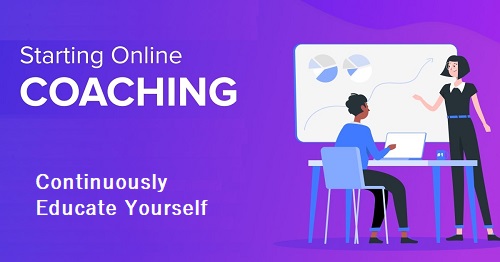Online Coaching - Continuously Educate Yourself
Stay updated with the latest coaching methodologies, tools, and trends. Attend coaching conferences, enroll in relevant training programs, or join coaching communities to enhance your skills and expand your knowledge. Continuous learning allows you to offer the best coaching experience to your clients.

Continuously educating yourself is essential for staying at the forefront of the coaching industry and providing the best possible coaching experience for your clients. Here's a step-by-step guide to help you stay updated and continuously expand your knowledge:
Identify your learning goals: Determine your specific learning goals and areas of interest within the coaching field. Reflect on the skills, knowledge, or techniques you want to develop or improve. This will help you focus your efforts and make informed decisions about the learning opportunities you pursue.
Research coaching resources: Explore various coaching resources such as books, online courses, webinars, podcasts, and industry publications. Look for reputable sources and experts in the coaching field. Consider both general coaching resources and those specific to your coaching niche. Take advantage of online platforms and communities that offer valuable insights and discussions related to coaching.
Attend coaching conferences and workshops: Attend coaching conferences, workshops, and seminars to gain knowledge, network with other professionals, and stay up to date with industry trends. These events often feature keynote speakers, panel discussions, and interactive sessions that provide valuable insights and opportunities for learning. Participate actively, engage with experts, and take advantage of the knowledge-sharing environment.
Enroll in coaching training programs: Explore training programs and certifications that align with your coaching goals. Look for programs that offer comprehensive curriculum, experienced instructors, and a practical approach. Consider programs that are accredited by recognized coaching organizations. These training programs provide structured learning and opportunities for hands-on practice and feedback.
Join coaching communities and associations: Connect with other coaches by joining coaching communities and associations. These communities provide opportunities to network, share experiences, and learn from each other. Engage in discussions, attend webinars or workshops offered by these communities, and contribute your own expertise. Collaborating with other coaches can broaden your perspective and foster professional growth.
Seek mentorship or supervision: Consider working with a mentor or seeking supervision from an experienced coach. A mentor can provide guidance, feedback, and support as you navigate your coaching journey. Supervision sessions offer a space for reflective practice, professional development, and ethical discussions. Learning from seasoned professionals can accelerate your growth as a coach.
Stay updated with research and publications: Keep up to date with the latest research, publications, and academic articles related to coaching. Stay informed about emerging trends, evidence-based practices, and new methodologies. Subscribe to coaching journals, follow thought leaders in the coaching field, and engage in discussions about research findings. This ensures that your coaching approaches are evidence-based and grounded in best practices.
Reflect and integrate your learning: Take time to reflect on your learning experiences and integrate new knowledge and skills into your coaching practice. Regularly review and assess the effectiveness of the strategies and techniques you have learned. Adapt and refine your coaching approach based on your continuous learning and feedback from clients.
Evaluate the impact of your learning: Continuously evaluate the impact of your learning on your coaching practice and the outcomes for your clients. Seek feedback from clients, track their progress, and assess the effectiveness of the techniques and methodologies you have implemented. Use this feedback loop to inform future learning endeavors and refine your coaching approach.
Embrace lifelong learning: Adopt a mindset of lifelong learning and curiosity. The coaching field evolves rapidly, and new research and practices emerge constantly. Embrace the opportunity to grow, adapt, and improve as a coach. Stay open to new ideas, challenge your assumptions, and be willing to explore innovative approaches that can enhance your coaching effectiveness.
By continuously educating yourself, you enhance your coaching skills, expand your knowledge base, and offer the best possible coaching experience for your clients. Embracing ongoing learning and professional development demonstrates your commitment to excellence and positions you as a trusted and knowledgeable coach.
